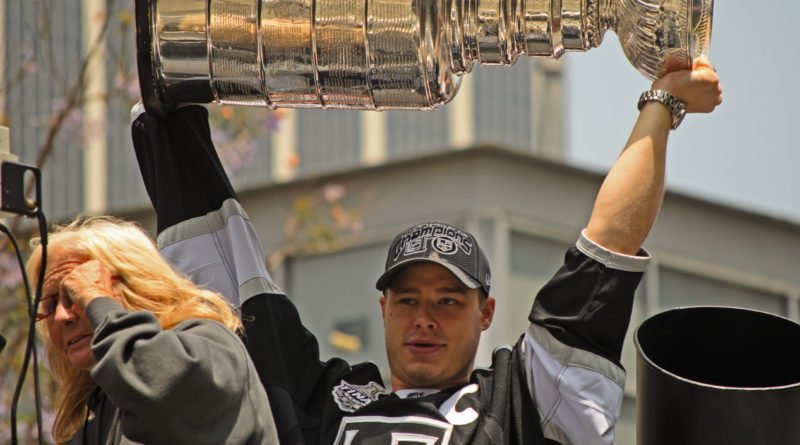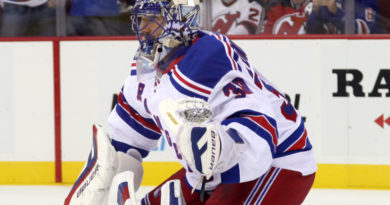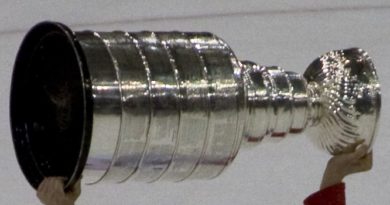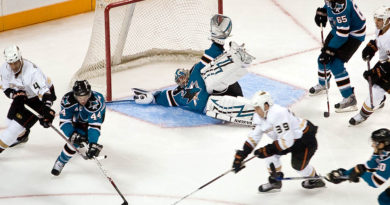The 10 Best Teams That Never Made The Stanley Cup Finals And The 10 Worst That Did
This article appeared in The Sportster on November 13, 2016.
Many sports fans consider the NHL playoffs to be the most exciting of any postseason among the major North American sports. The grueling schedule, the pace of the game and sudden death overtime all help contribute to this view. Then there are traditions that have endured for decades, such as playoff beards, handshake lines and flying octopi in Detroit. But perhaps the greatest thing about playoff hockey is how unpredictable it can be. Though the sport has a faster pace than baseball, football and basketball, scoring is at a premium. This creates opportunities for upsets; a fluky bounce of the puck or a shot that rings off the crossbar can alter a game and, therefore, an entire series.
While the postseason in basketball is typically straight chalk – seven of the past nine NBA champions were a #1 seed – the NHL playoffs are much more difficult for favorites to navigate. Of the past five teams to hoist the Stanley Cup, only one (the 2012-13 Chicago Blackhawks) was a division winner.
Though there have been many underachieving favorites and surprising underdogs that have helped make the NHL playoffs so thrilling, here are the 10 most notable of each from the last 30 years.
BEST TEAMS TO NOT REACH THE FINALS
10. QUEBEC NORDIQUES, 1995
The Quebec Nordiques began the lockout-shortened 1994-95 season by winning 12 of their first 13 contests and subsequently coasted to the Eastern Conference’s top seed. After finishing the previous season with the eighth-worst record in the NHL, they went 30-13-5 and outscored their opponents by an average of more than a goal per game. The Nordiques’ high-powered offense was led by 25-year old Joe Sakic (62 points in 47 games) and Peter Forsberg (50 points in 47 games), who won the Calder Trophy as the league’s most outstanding rookie. Once the playoffs began, though, Quebec was eliminated quickly by the sub-.500 New York Rangers, four games to two. The following year, the Nordiques moved to Denver and, of course, won the franchise’s first Stanley Cup as the Colorado Avalanche.
9. NEW YORK RANGERS, 1992
Two seasons before ending a 54-year championship drought, the New York Rangers won the Presidents’ Trophy with a 50-25-5 record. This was especially impressive considering they played in the difficult Patrick Division; based on points in the standings, the fourth-place Devils would have finished in second place in any other division. Mark Messier (107 points) won the Hart Trophy (MVP) and Brian Leetch (102 points) took home the Norris Trophy (league’s best defenseman). After squeezing by the New Jersey Devils, four games to three, in the first round, the Rangers were knocked out of the postseason by Mario Lemieux, Jaromir Jagr and the Pittsburgh Penguins, who finished 18 points behind New York during the regular season. The team shockingly missed the playoffs the following year, but then made several key trades and in 1994, won their first Stanley Cup since 1940.
8. DETROIT RED WINGS, 2006
The 2005-06 Detroit Red Wings seemed unbeatable when the playoffs began. They posted 124 points (58-16-8) and closed the year on a completely ridiculous 25-3-3 run. Detroit’s roster was littered with future Hall of Famers: Steve Yzerman, Brendan Shanahan, Nicklas Lidstrom, Chris Chelios and Pavel Datsyuk. The team was so well-balanced, they didn’t have a single skater among the league’s top 15 in scoring, yet still led the Western Conference in offense. However, the Wings were eliminated in six games by the #8-seed Edmonton Oilers, who had taken Detroit to overtime in three of their four regular season matchups. It’s hard to feel sorry for this squad, though; two seasons later, they defeated Sidney Crosby and the Pittsburgh Penguins for their fourth Stanley Cup in 11 years.
7. LOS ANGELES KINGS, 1991
Led by Wayne Gretzky’s 163 points (41 goals, 122 assists), the 1990-91 Los Angeles Kings won the Smythe Division and led the NHL in goal differential. They opened the season by winning 15 of their first 20 games and their 46 wins set a franchise record that wasn’t surpassed until last year. That year, the Kings were among the top four teams in the league in both goals scored and goals allowed. But despite Luc Robitaille’s postseason heroics (12 goals in 12 games), the team was knocked out by Gretzky’s former team, the Oilers (who finished 22 points behind L.A. in the standings), in the second round of the playoffs. Two years later, the Kings made their first Finals appearance, but fell to the Montreal Canadiens in five games.
6. ST. LOUIS BLUES, 2000
The 1999-00 season marked just the third time in franchise history that the St. Louis Blues reached the 100-point mark in the standings. Though they had no 30-goal scorers, the team was really strong defensively. The Blues had one of the best players in the league in defenseman, Chris Pronger (62 points, +52 rating). And goaltender, Roman Turek, had a career season, going 42-15-9 with an NHL-best 1.95 goals against average (minimum: 40 starts). In the playoffs, St. Louis dropped Game 7 of the first round at home against the eighth-seeded San Jose Sharks. The Blues had won the season series against the Sharks, 4-0-1, outscoring them 16-7 along the way. Sixteen years later, St. Louis is still looking to win its first Stanley Cup.
5. CALGARY FLAMES, 1988
Over a ten-year span from the mid-1980s to the mid-1990s, the Calgary Flames had a better collective record than any other team in hockey. They averaged a league-best 96.7 points during that time and won an NHL championship in 1989. But the previous year, in 1987-88, they won their first division title, finishing six points ahead of mighty Edmonton, who was still in the midst of their dynasty (five Cups in seven seasons). The Flames led the league in offense that season (4.96 goals per game) and had six of the league’s top 28 scorers, led by Hakan Loob’s 106 points and 21-year old Joe Nieuwendyk’s 51 goals. In the second round of the playoffs, however, Calgary fizzled and were swept, 4-0, by the Oilers.
4. PHILADELPHIA FLYERS, 1986
The 1985-86 Philadelphia Flyers led the Eastern Conference in wins, points, goals scored and goals allowed. Goalie, Bob Froese, led the NHL in save percentage (.909) and goals against average (2.55). Considering the era in which Froese played (Wayne Gretzky had 215 points and teams averaged 3.96 goals per game that year), those were stellar numbers. Defenseman, Mark Howe, posted 82 points and a league-leading +85 rating. Offensively, the Flyers were led by Brian Propp’s 97 points and Tim Kerr’s 58 goals (3rd in the NHL). Philly was clearly the best team in the East that year, but lost to the sub-.500 Rangers in the first round of the playoffs. During the regular season, they had defeated New York six times in seven matchups, including four head-to-head wins over their final 13 games.
3. OTTAWA SENATORS, 2006
As good as the 2005-06 Red Wings (#8 above) were, the Ottawa Senators were even better that year. Detroit’s 124 points were inflated a bit due to the fact that they had the league’s easiest schedule, statistically; the three worst teams in the Western Conference were in the Wings’ division that year. The Sens, however, were one of four teams with 90+ points in the Northeast Division. Yet despite the tougher level of competition, their goal differential was slightly better than Detroit’s. Led by two of the league’s top scorers in Dany Heatley (50 goals, 106 points) and Daniel Alfredsson (43, 103) and one of the best goalies the league has ever seen in Dominik Hasek, Ottawa led the East in both goals scored and goals allowed. After rolling past the Tampa Bay Lightning in the first round of the playoffs, however, the Senators fell to the Buffalo Sabres in five games.
2. PITTSBURGH PENGUINS, 1993
The 1992-93 Pittsburgh Penguins were two-time defending Stanley Cup champions, but they weren’t able to grab a third straight title. At 56-21-7, their 119 points were 10 more than any other club’s total. The Pens were led by Hart Trophy winner, Mario Lemieux (69 goals, NHL-best 160 points in just 60 games played!), but had firepower up and down their lineup. Forwards, Kevin Stevens (55 goals, 111 points) and Rick Tocchet (48, 109) joined Super Mario among the league’s top 15 scorers. And 20-year old Jaromir Jagr (34, 94) was just coming into his own as a league superstar. In the conference semifinals, Pittsburgh dropped the seventh and deciding game at home in overtime to the New York Islanders, a team that had finished 32 points back in the standings.
1. DETROIT RED WINGS, 1996
When most people think of the late-1990s Detroit Red Wings teams, they recall the back-to-back Stanley Cups and their incredibly consistent dominance. However, in 1996, the Wings were 41 years removed from their most recent title. So when they failed to win it all, despite posting a video game-like 62-13-7 record (the 131 points were one shy of the top NHL mark, set by the 1976-77 Canadiens), it was an enormous shock across the league. Detroit was stacked; 14 players on their roster scored more than 10 goals, led by Sergei Fedorov’s 39. Of their 27 skaters, enforcer, Stu Grimson, was the only one with a negative +/- rating. And their special teams were impeccable; they led the Western Conference in both power play and penalty kill percentages. In the Conference Finals, they lost to eventual champs, Colorado, in six games.
WORST TEAMS TO REACH FINALS
10. CHICAGO BLACKHAWKS, 1992
The 1992-93 Chicago Blackhawks made their first Finals appearance in 19 seasons. They hadn’t won the Cup in 31 years. However, when they got to the big stage, they got swept, 4-0, by the Pittsburgh Penguins. Offensively, the team struggled all year. Center, Jeremy Roenick, led the team with 53 goals and 103 points, but no other Blackhawk placed among the league’s top 45 in scoring. Chicago’s strength was in net, where they had Ed Belfour and Dominik Hasek between the pipes. They gave up the second-fewest goals in the NHL, but had trouble with the league’s best teams all year; they were just 3-11-2 against the four division winners during the regular season. This would be the Blackhawks’ last trip to the Finals until they finally broke their long championship drought in 2010.
9. MIGHTY DUCKS OF ANAHEIM, 2003
In 2003, the seventh-seeded Mighty Ducks of Anaheim managed to knock off the Western Conference’s top two seeds on the way to their first Stanley Cup Finals. There, they came up a game short, losing to the New Jersey Devils, 4-3. The team certainly got stronger as the season progressed. After opening with a 15-16-7 record through 41 games, they closed 25-11-2 during the second half of the year. But as a whole, their season was not overly impressive. The Ducks only outscored their opponents by 10 goals over the course of an 82-game schedule. Paul Kariya (81 points) was the lone player on Anaheim with at least 60 points and one of only two Ducks (along with Petr Sykora) to post more than 20 goals.
8. LOS ANGELES KINGS, 2012
The only team on this entire list to win the Stanley Cup, the 2011-12 Los Angeles Kings simply turned on a switch during the playoffs. Their roster consisted of just five players with as many as 10 goals, though goalie, Jonathan Quick, was second in the league in goals against average (1.95) and fifth in save percentage (.929). The Kings didn’t exactly enter the postseason on a roll; they dropped three of their last four regular season games and five of their last eight. In each of their four playoff series, however, they raced out to a nearly insurmountable 3-0 lead. Though they were a lowly eighth seed, they knocked out all three Western Conference division winners – winning 12 of 14 games in the process – en route to the Finals, where they beat the Devils in six games.
7. WASHINGTON CAPITALS, 1998
As great as Alex Ovechkin has been in Washington, he has never reached the Conference Finals, let alone the Stanley Cup Finals. In fact, the Capitals’ franchise has only played for the Cup once and that was in 1998. That year, Peter Bondra was the team’s star player (an NHL-leading 52 of the team’s 219 goals) and they were backstopped by Olaf “Olie the Goalie” Kolzig (33 wins, 2.20 goals against average). During the season, Washington was a middling team; they ranked 13th in goals scored and 10th in goals allowed. But in the first round of the playoffs, they caught some breaks when the top three seeds in the Eastern Conference were all eliminated by other teams. Those upsets helped clear the path to the Finals, where Washington was swept by the defending champion Red Wings.
6. EDMONTON OILERS, 2006
The 2005-06 Oilers made an incredible run to the Finals as an #8 seed. In the first round, they knocked off Detroit, who had captured the Presidents’ Trophy with 124 points. This was an Edmonton team that had only outscored its opponents by five goals on the year. But the Oilers had performed very well against their Western Conference playoff foes; they posted a 9-2-0-1 record versus Detroit, Anaheim and San Jose during the regular season. During the postseason, they enjoyed similar success by going 12-5 against those clubs. This was a team without a single player among the top 30 in the NHL in scoring. But they got all the way to Game 7 of the Stanley Cup Finals, where they lost to the Carolina Hurricanes.
5. PHILADELPHIA FLYERS, 2010
On the final day of the 2009-10 regular season, the Flyers defeated the Rangers in a shootout. The extra point was an enormous difference in the standings between the two teams, as the Flyers qualified for the playoffs, while the Rangers were eliminated. But despite the victory, Philly limped into the postseason after going 8-10-3 over their last 21 games. After defeating the Devils in the first round, they found themselves behind the Boston Bruins, three games to none. The Flyers then won Game 4 in overtime and shockingly took the next three contests to advance. Eventually, they lost to the Blackhawks in six games on the NHL’s biggest stage. Philadelphia has now dropped all six of their Stanley Cup Finals appearances since winning their last Cup in 1975.
4. VANCOUVER CANUCKS, 1994
When Mark Messier and the 1993-94 New York Rangers famously broke the franchise’s 54 year championship drought, they needed a Game 7 victory over the Vancouver Canucks to pull it off. Though the Canucks fought admirably throughout the playoffs, they were not a very strong team during the regular season. Coming off their first 100-point campaign during the previous year, Vancouver was just a game over .500 at 41-40-3 and scored only three more goals than their opponents. Twenty-two year old Pavel Bure led the NHL with 60 goals, but the team otherwise featured very little star power. In net, goaltender, Kirk McLean, had a losing record and a save percentage of just .891 (23rd among the 29 goalies with 40 or more games played).
3. CAROLINA HURRICANES, 2002
Though the 2001-02 Carolina Hurricanes won the Southeast Division, they were not a very good hockey team. They padded their 35-26-16-5 record by playing over 23% of their schedule against the four worst teams in the Eastern Conference (losing just one of the 19 games in regulation versus them). Their goal differential for the season was +0 and they were tied for 20th in the NHL in wins. Carolina was a veteran team; their top two centers, Ron Francis (27 goals, 77 points) and Rod Brind’Amour (23, 55) were both in their 30s, as were their top two goaltenders, Arturs Irbe and Tom Barrasso. The ‘Canes benefitted when the other two division winners in the East were knocked out in the first round by other clubs. After getting through the first three series of the playoffs in six games each, they ran into the Red Wings and were promptly eliminated, four games to one.
2. MINNESOTA NORTH STARS, 1991
With a record of 27-39-14, it seems impossible that the 1990-91 Minnesota North Stars even qualified for the playoffs and yet, they somehow came within two games of winning the whole damn thing. But back then, the Clarence Campbell Conference had just 10 teams – and eight of them made the postseason. The North Stars weren’t even the worst playoff team (Vancouver only had 65 points)! On offense, the team was led by Dave Gagner (40 goals, 82 points), Brian Bellows (35, 75) and 20-year old Mike Modano (28, 64). In the first round, Minnesota dumped the Blackhawks, who had won the Presidents’ Trophy with 106 points. Next, they bounced the Blues (105 points), before toppling Mark Messier’s Oilers. But the North Stars’ magical ride ended in the Finals, when Mario Lemieux (44 points in 23 playoff games) and the Penguins won their first Stanley Cup.
1. LOS ANGELES KINGS, 1993
It seems strange to have a team with Wayne Gretzky on its roster sitting atop this list, but the 1992-93 Kings were not very good. For starters, The Great One only played 45 games during the regular season. Though Los Angeles was fifth in the NHL in scoring, they gave up the fourth-most goals in the league, resulting in a minus-two goal differential. That’s not an impressive stat, considering they got to beat up on the San Jose Sharks (11-71-2) seven times that year. In Gretzky’s absence, Luc Robitaille picked up the slack with 63 goals and 125 points. But starting goalie, Kelly Hrudey posted mediocre numbers; he was 13th in save percentage and 21st in goals against average (minimum: 40 games). In the Finals, the Kings fell to the Canadiens in five games; it remains the last Stanley Cup won by a team from north of the border.
All stats above are from Hockey Reference
(photo by JulieAndSteve)



